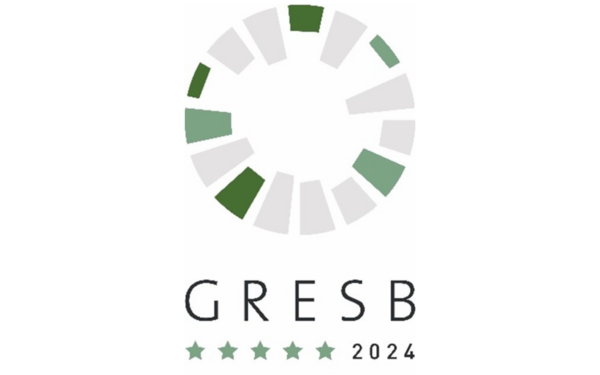Notice Concerning Results of GRESB Real Estate Assessment Achieved the highest rating of "5 Stars" for the eighth consecutive year
Tokyo Tatemono Co., Ltd. (Head Office: Chuo-ku, Tokyo; President & CEO: Hitoshi Nomura; hereinafter "Tokyo Tatemono") announces that it participated in the 2024 GRESB Real Estate Assessment and achieved the highest rating of “5 Stars” for the eighth consecutive year in the GRESB Standing Investment Benchmark.

Evaluation results
Tokyo Tatemono has participated in GRESB every year since 2013, continuously aiming to attain higher results. In 2024 as well, Tokyo Tatemono participated in the GRESB Real Estate Assessment, which evaluates the sustainability efforts of real estate companies and funds, and has become the only real estate developer to have achieved the highest rating of “5 Stars” for the eighth consecutive year in the GRESB Standing Investment Benchmark, which assesses the performance of standing investment portfolio.
Overview of GRESB and GRESB assessments
GRESB is an annual benchmarking assessment to measure ESG (Environmental, Social and Governance) integration of real estate companies and funds, as well as the name of organization which runs the assessment. It was founded in 2009 by a group of major European pension funds who played leading roles in launching Principles for Responsible Investment (PRI).
Currently, about 150 Investor Members use GRESB data for their investment decision-making and engagement with investees, and several institutions from Japan including the Government Pension Investment Fund(GPIF) utilize GRESB Assessment results. In 2024, 2,223 listed or private real estate companies/funds participated in GRESB Real Estate Assessment.
〔Official website of GRESB〕 https://www.gresb.com/nl-en/
Approach to sustainability
The Tokyo Tatemono Group is promoting the advancement of ESG management in order to achieve both "solving of social issues" and "growth as a company" at a higher level, based on the long-term vision “Becoming a Next-Generation Developer,” looking ahead to around 2030. In particular, the Group recognizes that climate change is one of the most important social issues and that it is our social mission to contribute to the realization of a decarbonized society. The Group has set medium- to long-term goals for reducing greenhouse gas emissions to achieve a decarbonized society, aiming to reduce CO2 emissions*1 by 46.2% for Scope 1 and 2 by FY2030 (compared to FY 2019), by 40% for Scope 3 (compared to FY 2019), and achieve net zero for Scope 1,2, and 3 by FY2050.
To achieve these medium- to long-term targets, the Group will accelerate specific efforts to realize a decarbonized society, such as the introduction of renewable energy*2, development of ZEB*3 and ZEH*4, and acquisition of green building certification*5. The Group will continue to contribute to the realization of a sustainable society.
〔Sustainability page of Tokyo Tatemono’s website〕 https://tatemono.com/english/sustainability/
- 1
Scope 1 : Direct emissions that occur from the use of fuel by the Group
Scope 2 : Indirect emissions that occur from the use of electricity and heat purchased by the Group
Scope 3 : Indirect emissions that occur from other business activities (Target for FY2030 is, Category 11 and Category 13) - 2
Includes consumption of non-fossil fuel certificates.
- 3
Zero Energy Building (ZEB) is a building that aims to achieve an annual primary energy consumption balance of zero by maximizing energy independence through the use of advanced technologies that enable significant energy savings and the introduction of renewable energy. ZEB includes “ZEB” (energy consumption reduction rate of at least 100% through energy saving and energy creation), Nearly ZEB (energy consumption reduction rate of at least 75%), ZEB Ready (energy savings of at least 50%), and ZEB Oriented (energy savings of at least 40% in office buildings and 30% in hotels with a floor space of 10,000 m2 or more).
- 4
Zero Energy House (ZEH) reduces total energy consumption through measures such as heat insulation and energy savings as well as generating energy through power generation to balance out the annual primary energy consumption to zero. The ZEH standard for condominiums (residential buildings) includes ZEH-M (energy consumption reduction rate of at least 100% through energy saving and energy creation), Nearly ZEH-M (energy consumption reduction rate of at least 75%), ZEH-M Ready (energy consumption reduction rate of at least 50%), and ZEH-M Oriented (energy savings of at least 20%)(ZEH-M will be replaced by ZEH in the case of residential units).
- 5
Green Building Certifications are indices to objectively evaluate buildings designed by fully considering ways to enhance environmental performance throughout the entire structure from the energy used during construction and operation to the reduction of water consumption and facility greening. Green building certifications encompass a wide variety of programs. In Japan, the DBJ Green Building Certification program is operated by the Development Bank of Japan (DBJ). The Comprehensive Assessment System for Built Environment Efficiency (CASBEE) is a certification program supported by the Ministry of Land, Infrastructure, Transport and Tourism to evaluate and rate various aspects of buildings from environmental performance to comfort. The Building-Housing Energy-efficiency Labeling System (BELS) is a third-party certification system for the labeling of buildings’ energy performance.
Related information
・ Bringing forward the target for the shift to renewable electric power in the Commercial Property Business by 20 years Transitioning to 100% renewable energy by FY2030
https://pdf.irpocket.com/C8804/WYlc/G6EZ/VFmh.pdf
・ Tokyo Tatemono Group raises its mid- to long-term greenhouse gas emissions reduction target for FY2030 to achieve the 1.5℃ scenario
https://pdf.irpocket.com/C8804/NvAy/MeeX/RQVV.pdf



